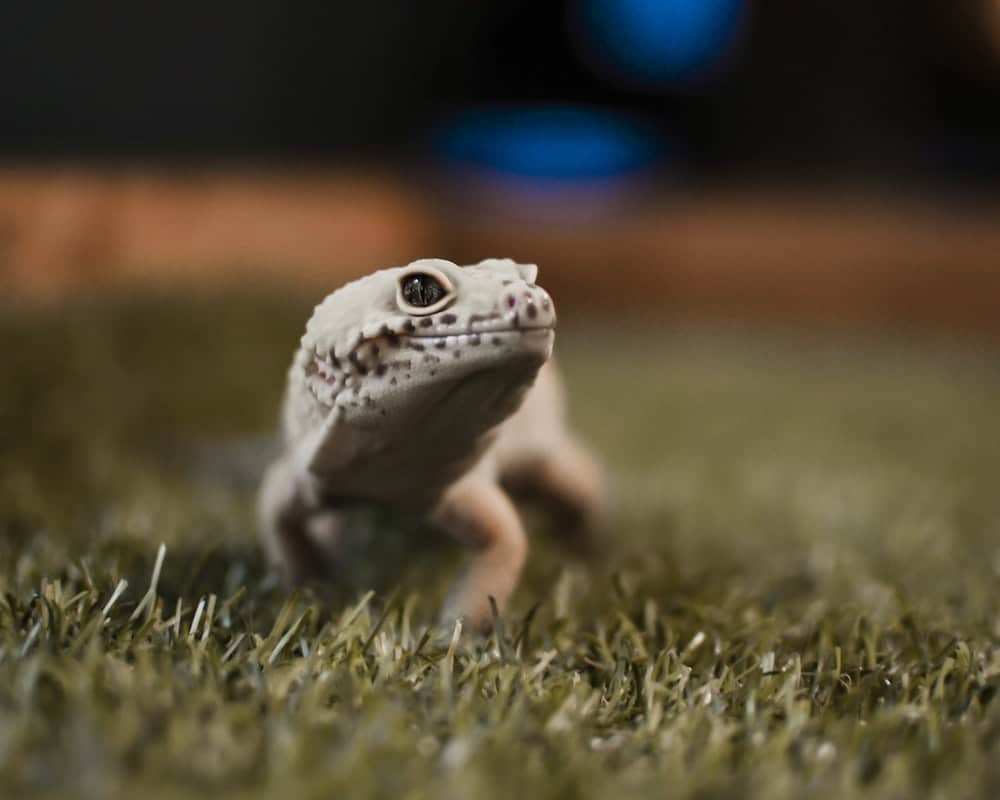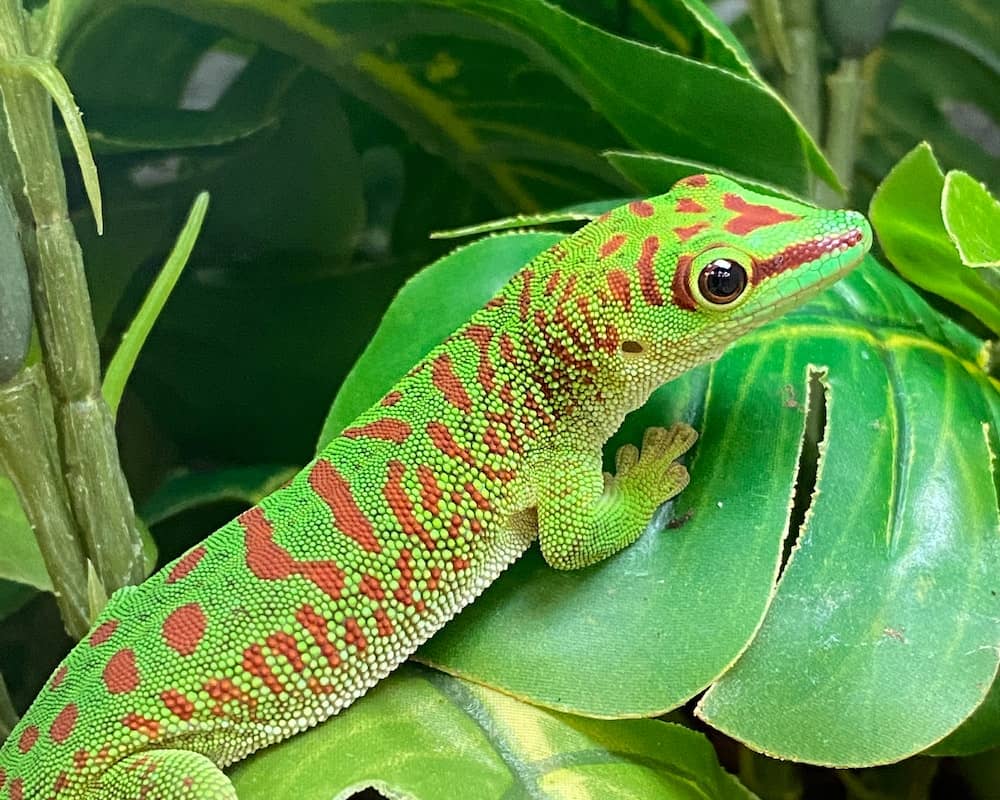Most Geckos are nocturnal species, which means they are active during the night compared to the daytime. Well, the question is how well they can see in the dark.
Geckos can see much better at night. Along with being able to see at night, while most nocturnal animals are color-blind, geckos can see in color at night, which makes them unique. When we talk about leopard geckos, their night vision is 350 times better than humans, and they can also see in color.
Let us dive into the topic more and see how they see in the dark and how you can observe them without using lights.
Can Geckos See in the Dark? Do They Have Night Vision?
Yes, these reptiles do have night vision. Also, while humans can only see in black and white in the dark, these reptiles can see in color.
They have excellent night vision and are considered one of the only vertebrates or species that can differentiate between subtle color differences. For example, they can distinguish between gray and blue even in dim lights.
Scientific Experiment:
Scientists experimented to check how well these reptiles can see in the dark. They trained a female and a male gecko to eat off tongs with a blue or gray card attached.
The tong with a blue card had a juicy bug, whereas the tong with a gray card had a cricket dipped in salt water.
First, the geckos learned that the blue card tong had a delicious bug. Later, the scientists tested the trained them under dim lights or low levels of light. The light level was equal to dim moonlight.
The light was so low that even the scientists in the room could not tell the difference between blue and gray. What surprised them was that they ate the bug attached to the blue card twice as often as the salty cricket attached to the gray card.
The experiment showed them that these reptiles could differentiate between colors even in dim lights, which a human eye could not do.
How Do Geckos See in the Dark?
Geckos come from the lizard family. They came from lizards that did not have night vision rods and those that lived actively through the day.
Due to evolution, these reptiles learned to live at night. Additionally, their color receptors became more sensitive.
If you notice, most geckos have big bulging eyes. Their eyes have glittering dots and patterns.
How Did They Evolve?
Previously, all lizards were diurnal animals. Diurnal animals are those who are active during the day. They feed, socialize, and hunt during the day and sleep at night. Their eyes used to have a normal vertebrate double retina. They had cones and rods.
Cones and rods are typical eye’s two types of photoreceptors. In situations with more lights, cones become active and provide clear vision. When there is less light, rods take charge of the vision.
During evolution, lizards with a normal vertebrate double retina lost it due to their daily activities. The normal vertebrate was replaced with several single and double-cone photoreceptors.
At one point, these lizards evolved into geckos. Most geckos were initially nocturnal and needed good vision at night to hunt. They started hunting at night because there was less light then, which would help them in the long run. Hunting at night was much safer for them compared to the day.
Due to them having only cones as photoreceptors, their cones evolved to provide them a better vision at night. Their cones became more sensitive and extensive to lights. Which means they are light-sensitive and become larger over time.
Do Their Eyes Become Hyper-Sensitive to Lights in the Dark?
Nocturnal geckos have large eyes and pupils, short focal lengths, and highly light-sensitive photoreceptors. This enhances their vision and makes it easy for them to hunt and catch their prey at night. Additionally, it helps them see in color where the light conditions are low.
How to Observe Your Gecko in the Dark Without Bright Lights?
It is not unusual to want to check on your pet at night or in the dark. You must provide them with a dark space to provide them with a natural rhythm for them at night.
That being said, you can still check on your pet in the dark in the following ways:
- Black Light
Your pet might be able to see some light coming from the black light, but the advantage of using a black light is that it is much dimmer than their daytime lighting.
With a black light, you can observe light-colored morphs on your pet. You must remember that you should not keep them turned on all night. It can affect your pet’s circadian rhythm. You can use it for an hour.
- A Surveillance Camera
You can use a surveillance camera that comes with night vision. You can purchase a camera that has infrared HD night vision.
You can set the camera up in your pet’s enclosure. This is one of the best ways to check on them as you are not using any lights and can also check on them from a distance.
Overall, this method will not interfere with your pet’s circadian rhythm.
- Blue or Red Lights
You can use a red or blue light to check on your pet in the dark, as it will not interfere with their nightly routine as much as a bright white light would do.
You must remember that your pet can see red or blue light, so it is advised to use it only for some time.
If you leave it on longer, it can interfere with their hunting, or they might be unable to detect their food accurately with the lights on.
A Pro Tip For You
We understand that you want to check on your pet and see what they are up to at night because they are active during the night.
You must remember that as much as it is fun to see your pet’s nighttime routine when you keep the lights on, it interferes with their natural circadian rhythm.
That is why, even if you use black, red, or blue lights, it is better to keep them turned on only briefly.
Now, here is what you can do without causing a disturbance to your pet.
You can get customizable lights and install them in their enclosure. You can get a light to program evening lighting modes, sunrise, and sunset. This customizable light will help you choose how much needs to be showcased at different times of the day.
You can even choose where on the color spectrum you want the light to fall.
These light settings will replicate the sunrise and evening sun, which can help your pet maintain their natural circadian rhythm.
Additionally, it will also give you a chance to see your pet.
Note: These light settings should not provide heat at night.
Do You Need to Feed Your Pet at Night?
You should feed your gecko at night as they are nocturnal animals.
What to Feed Your Pet?
These reptiles feed on a variety of insects. You must mix the insects and not rely on only one insect.
Here is what you can feed them:
- Crickets: They are the easiest to purchase. Crickets contain the best nutrition and will be the backbone of your pet’s diet.
- Mealworms: Even mealworms provide good nutrition.
- Files: You can easily find fruit flies, which are easy to purchase.
- Wax Worms or superworms: These worms provide excellent nutrition, and these reptiles love them.
Important Tips:
- Provide mealworms and crickets as their primary source of food. These insects will provide your pet with a high level of nutrition. You can even provide them with flies.
- Flies are the best option for baby geckos as they can not consume big insects.
- Superworms or fatty worms can be given as a treat to your pet once a week.
How to Feed Them?
If you have a baby gecko, you must feed them daily. It is the best time to start a routine for your pet when they are a baby. Try feeding them at a similar time every day to create a routine.
Once they become bigger and not a baby anymore, you can feed them every other day. After a year, you can feed them three times a week.
You must remember that since the feeding frequency decreases as they grow older, you must increase the amount of food you serve them.
Here is a tip: you can set a timer when you feed them as they age. You can set a timer for 10 minutes when you begin their feeding process. You should stop when the timer goes off. During this process, you must track how many bugs your pet has eaten.
You must keep track of what they are eating in a given week. You must provide them with a balanced diet. You must also remember not to throw the insects in the tank. It is better to place them in the enclosure.
Also, always keep water available at all times in their enclosure as geckos can get thirsty or dehydrated, and they need some water to wash down the bugs they ate.


